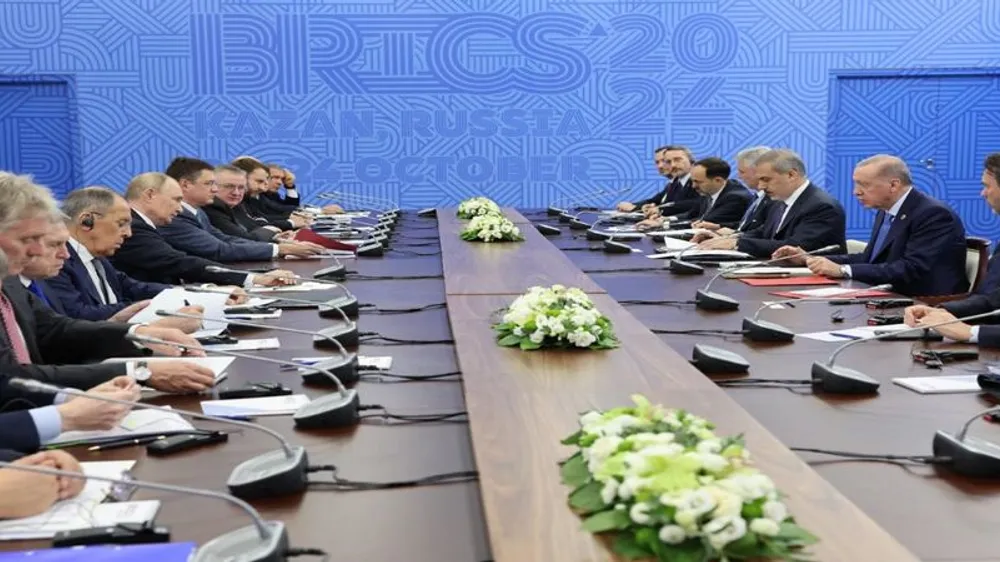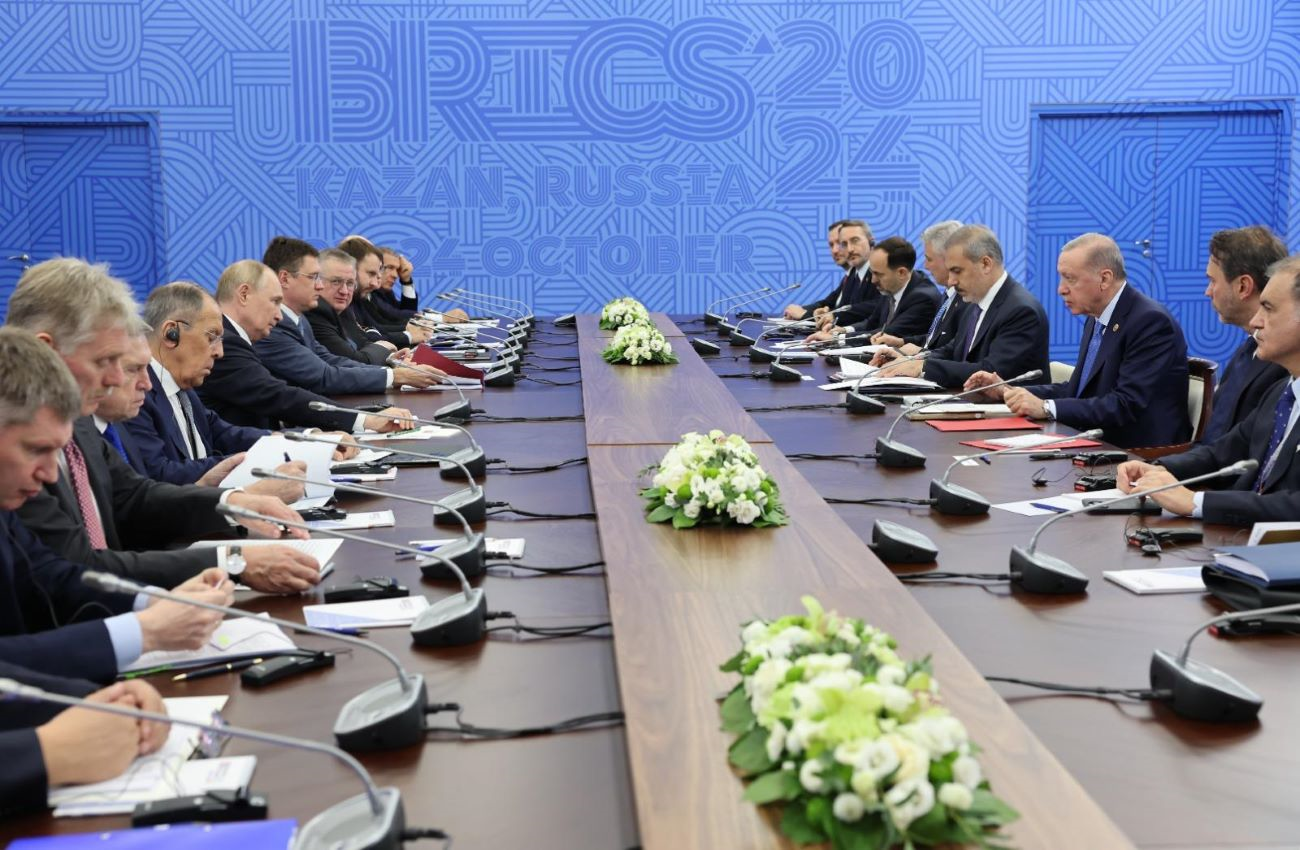
Turkey’s BRICS Application: Economic and Financial Context
Turkey's engagement with BRICS is not a geopolitical shift but rather a balancing act that reflects the changing dynamics of the global economy, as it seeks to navigate its traditional ties to the West while embracing new opportunities for growth and collaboration.
Turkey submitted its application to join BRICS several months before Russian 2024 BRICS Chairmanship, sparking debate over whether this move stems from dissatisfaction with the West. Some observers point to other geopolitical factors, such as the Israel-Gaza conflict, backed by the U.S., and the ongoing tensions with the U.S., Europe and NATO over Turkey in regional conflicts. However, beyond the political and geopolitical dimensions, this analysis focuses on the economic and financial factors that underpin Turkey’s strategic decision to pursue BRICS membership, particularly as the world’s economic center increasingly shifts toward Asia. The upcoming BRICS Summit, to be held in Kazan, the capital of the Republic of Tatarstan, Russia, from October 22-24, 2024, brings BRICS back into focus once again.
Toward the Multi Power World Order
BRICS, originally formed in 2009 by Brazil, Russia, India, and China, was established as an informal platform to challenge the global order dominated by the U.S. and its Western allies. In 2010, South Africa joined, transforming the group into BRICS. Recently, the expansion of BRICS to include countries such as Iran, Egypt, Ethiopia, and the United Arab Emirates has significantly enhanced its geopolitical influence. This enlargement has contributed to the emergence of a multipolar world order, allowing BRICS to extend its global reach and challenge the dominance of traditional Western powers.
Economically and financially, BRICS positions itself as an alternative to Western-led institutions like the World Bank and the International Monetary Fund. Through the BRICS Development Bank, new and existing members have access to financing opportunities that strengthen political and trading relationships. The BRICS Contingent Reserve Arrangement (CRA) functions as a financial safety net for its member countries, providing liquidity support during times of balance of
payments crises, and is an important mechanism for enhancing financial stability and reducing dependence on Western-led institutions like the IMF. BRICS PAY, the bloc's payment system, plays a crucial role in advancing de-dollarization by promoting trade in local currencies. Additionally, it provides a mechanism for countries to avoid sanctions and freezing of assets by the Western bloc, further cementing BRICS’ strategic importance in global economic affairs.
Collaboration in Trade and Strategic Industries with BRICS Nations
The center of global trade is shifting toward Asia, and the dominance of Western financial institutions is gradually fading as emerging financial institutions within the BRICS bloc gain influence. Consequently, aligning with BRICS has become more strategically important than ever for countries—including Turkey—seeking to diversify their economic partnerships and reduce reliance on traditional Western financial systems in multi power world order.
Turkey’s primary motivation for joining BRICS is clear: the economy. As the center of the global economy continues to shift toward the non-Western world, Turkey's trade relationships are following a similar trajectory. In 2023, nearly 60% of Turkey's total trade was with BRICS countries, surpassing trade with its main commercial partner, the EU. Economically, BRICS largely represents Turkey's ties with Russia and China, which together account for 87% of Turkey's trade with the bloc. However, these economic relationships are highly asymmetric, as Turkey’s exports to these countries make up only 15.7% of its imports.
Turkey views joining BRICS as a means to enhance economic cooperation with Russia and China while positioning itself as a trade conduit between the EU and Asia.
In the past decade, BRICS members, particularly Russia and China, have emerged as crucial partners for Turkey in strategic industries, including nuclear energy, telecommunications, technology, defense, and infrastructure investments.
Türkiye has established strategic partnerships with Russia and China for nuclear power projects. In collaboration with Moscow, Ankara is currently building its first nuclear reactor, the Akkuyu Nuclear Project. Additionally, the proposed Sinop Nuclear Power Plant, located on the Black Sea, is under discussion with China, Russia, and South Korea in 2023. If realized, it will be Türkiye's second nuclear power plant following Akkuyu. Significant progress was made last year concerning
Türkiye's third nuclear power plant in cooperation with China, with further developments anticipated during a possible visit by Chinese President Xi Jinping to Türkiye.
As Turkiye’s defence-industrial strategy has changed over time, so have its interactions with western countries in this sector. Türkiye as a NATO member attempted to purchase F-35s, the latest generation of U.S. stealth jet fighters. However, the deal collapsed after Türkiye initiated the installation of Russia’s advanced S-400 air-defense missile system. Similarly, despite Türkiye's interest in acquiring Eurofighter jets, Germany has blocked the sale. As a result, Türkiye's military and defense collaboration has increasingly shifted toward BRICS members. Furthermore, the defense industry has played a vital role in exploring energy resources in the Mediterranean Sea and ensuring regional stability, which has the potential to lead to conflicts with neighboring countries.
New Horizons in Energy, Trade, and Investment
Türkiye has developed a close relationship with China, marked by significant investments from Chinese e-commerce, banking, and telecommunications companies. Recently, a strategic cooperation agreement was signed in Shanghai between the Chinese state-owned company Lingang Shanghai Data Port and the China Trade Association, based in Türkiye. This agreement aims to establish a trade and technology center in Türkiye, facilitating substantial investments from Chinese companies, fostering collaboration with Turkish businesses, and supporting local technology firms, startups, and development zones through Chinese technologies. Additionally, Türkiye has been actively seeking investments from Chinese electric car manufacturers, which could leverage Türkiye’s customs union with the EU to enhance their market access.
Türkiye's partnerships with Russia and China are crucial for enhancing strategic energy and trade routes. The Middle Corridor Initiative aligns seamlessly with China’s Belt and Road Initiative, providing a robust framework for cooperation in various sectors. Türkiye is eager to collaborate closely with China to achieve tangible outcomes in trade, investment, finance, agriculture, tourism, education, and more through mechanisms such as the China-Türkiye Intergovernmental Cooperation Committee.Similarly, Russia's strategic pivot from the South Stream project to the TurkStream project signifies its commitment to strengthening energy ties with Türkiye. By altering its route and name, Russia underscores the importance of this partnership in enhancing energy
security and diversifying supply routes for both countries. Together, these collaborations not only bolster Türkiye's position as a vital transit hub but also contribute to regional stability and economic growth.
Russia plays a significant role in Türkiye's real estate market, particularly through its participation in BRICS. Since 1987, Turkish construction companies have completed numerous projects in Russia, generating approximately $102 billion. This long-standing collaboration has strengthened ties between the two countries and facilitated mutual investment opportunities.
Moreover, following the Russia-Ukraine war, Russian nationals have emerged as the largest group of foreign homebuyers in Türkiye. In 2022, they purchased 16,312 homes, and this trend continued into 2023 with 10,560 purchases. This surge in Russian investment in Turkish real estate not only bolsters the sector but also highlights the importance of Russia as a key partner in Türkiye's economic landscape.

